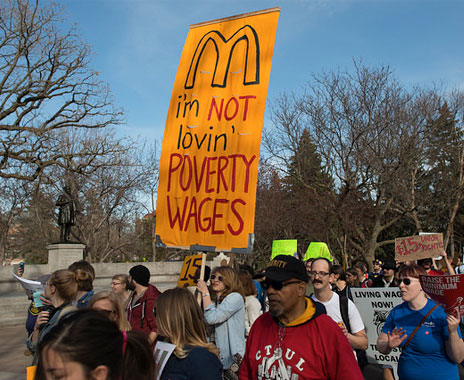The foodservice wage debate has been heating up this year as several states and cities implement minimum wage hikes and pressure increases to raise hourly wages to $15. Last month, the movement to increase minimum wages scored a victory in the state of New York—a victory that specifically singles out quick-service restaurants.
A panel appointed by New York Gov. Andrew Cuomo recommended in July that the minimum wage be raised for employees of quick-service chains with 30 or more units nationwide from $8.75 an hour to $15. Wages would be raised faster in New York City (to be implemented by December 31, 2018) than the rest of the state (July 1, 2021) to account for a higher cost of living.
The $15 wage will represent a more than 70 percent increase when fully implemented. The decision comes after similar increases in minimum wages in other cities, including Los Angeles, San Francisco, and Seattle.
In June 2014, Seattle’s City Council passed an ordinance increasing the minimum wage within the city limits. It began with an increase to $11 per hour on April 1 of this year and eventually will grow to $15 per hour for all employers by 2022.
Such a dramatic change as New York’s, geared specifically toward the quick-service industry, could hinder future company growth, says Gary Levy, partner and hospitality industries practice leader at CohnReznick, an accounting, tax, and advisory firm.
“Premium quick-service brands are already paying above minimum wage,” Levy says. “This legislation could have a dramatic effect on other operators who will need to look long and hard at ways to survive. It could be a huge burden.” Levy says that the wage legislation, while well intended, could make expansion difficult and may affect private equity and capital investment because of lower profit margins.
These new legislative actions are especially threatening to small operators, says Michael Saltsman, research director at the Employment Policies Institute, a research organization that studies public policy issues surrounding employment growth.
“The biggest concern is for franchisees that might own a single Subway or other restaurant,” Saltsman says. “Even with a phase-in period designed to make it absorbable, at some point, things just aren’t workable.”
Saltsman says larger chains can employ technology, such as mobile ordering and self-service kiosks, that helps save on labor costs, but he adds that the technology isn’t always realistic for smaller operators. In addition, tax credits can offset some of the higher wage costs but have a lesser impact on small businesses.
Many Americans feel there should be an increase in the minimum wage. A 2014 survey by the restaurant research firm Technomic found that 83 percent of Americans support an increase in the minimum wage. Some retailers, including Walmart, Target, and McDonald’s, have already promised to boost starting pay for their employees, although these increases are small compared with the $15-per-hour target. In his 2014 State of the Union address, President Obama called on Congress to raise the national minimum wage to $10.10 per hour.
The time has come for operators to increase wages and to look at employees as an investment in the future instead of as an easily replaceable commodity, says Dennis Kessler, professor of business at Simon Business School at the University of Rochester.
“A cheap labor business model is terrible, and truly great companies don’t think that way,” says Kessler, a former Burger King franchisee who co-owned 21 restaurants with his brother for 37 years. He also co-owned 48 Friendly's restaurants for 14 years. “I used to panic when wages and other costs went up, but all of my competitors had to adjust as well. It won’t be as cataclysmic as many think.”
Kessler says restaurant operators should become more technologically astute and make some changes to save on labor costs. Ultimately, menu prices will have to go up for most quick-service restaurants, but growth in the industry, he says, will offset those increases.
“The entire consumer base will absorb the increases, as they have in the past,” Kessler says. “Being fair to your workers matters to your customers. To be competitive, you need to have better workers, recognize their talents, and potentially provide a career for them. Owners need to be smart about this.”













